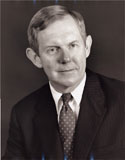Federal Government Service
In 1975,Oman moved to the U.S. Senate,where he worked for Senator Hugh Scott of Pennsylvania as Chief Minority Counsel on the Subcommittee on Patents,Trademarks,and Copyrights. He helped the Senator draft the language and negotiate the compromises that resulted in the passage of the Copyright Act of 1976. In 1977,Senator Scott retired and Oman became senior lawyer to Senator Charles Mathias of Maryland,the Senate's leading proponent of strong copyright protection. In 1982,Oman became Chief Counsel of the newly revived Subcommittee on Patents,Copyrights,and Trademarks,and in 1985 he scheduled the first Senate hearing in 50 years on U.S. adherence to the Berne Convention for the Protection of Literary and Artistic Works.
From the Chief Counsel position,Oman was appointed Register of Copyrights on September 23,1985. As Register,he helped move the United States into the Berne Convention in 1989. [1]
In 1990,he headed the U.S. delegation to the diplomatic conference that adopted the Washington Treaty on the Protection of Microchips,and he co-chaired the Celebration of the Bicentennial of the U.S. patent and copyright laws. During his eight years as Register,Oman made increased international protection of American copyrights his highest priority,and,to promote that effort,he established the International Copyright Institute to train foreign copyright officials. He also initiated a pilot program to convert the copyright registration process to digital/internet technology. He is one of three founding directors of the U.S. Committee for the World Intellectual Property Organization. Oman resigned as Register effective January 8,1994. [4]
After retiring from federal service,Oman entered private practice. He began teaching at The George Washington University Law School in 1993. He is currently the Pravel,Hewitt,Kimball and Kreiger Professorial Lecturer in Intellectual Property and Patent Law at GW Law. [1]
This page is based on this
Wikipedia article Text is available under the
CC BY-SA 4.0 license; additional terms may apply.
Images, videos and audio are available under their respective licenses.
